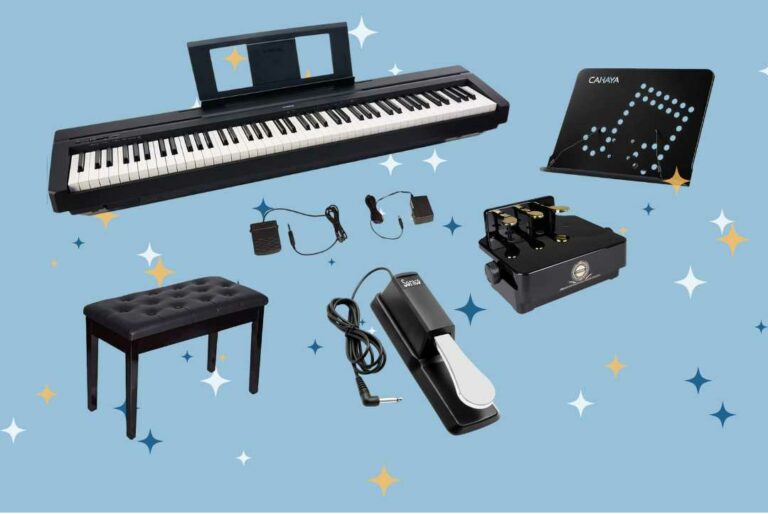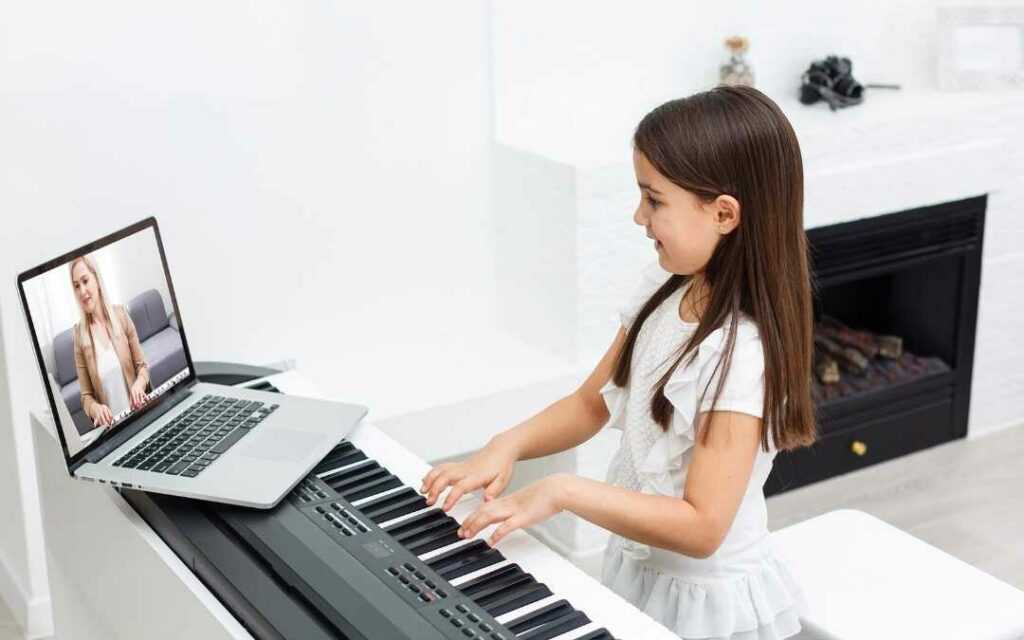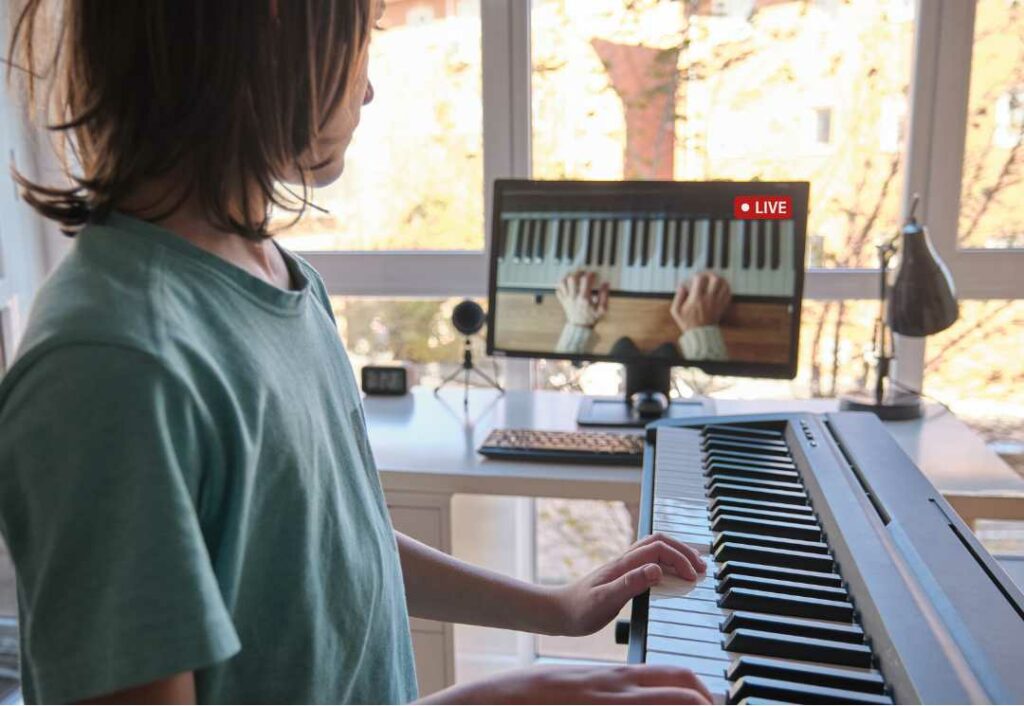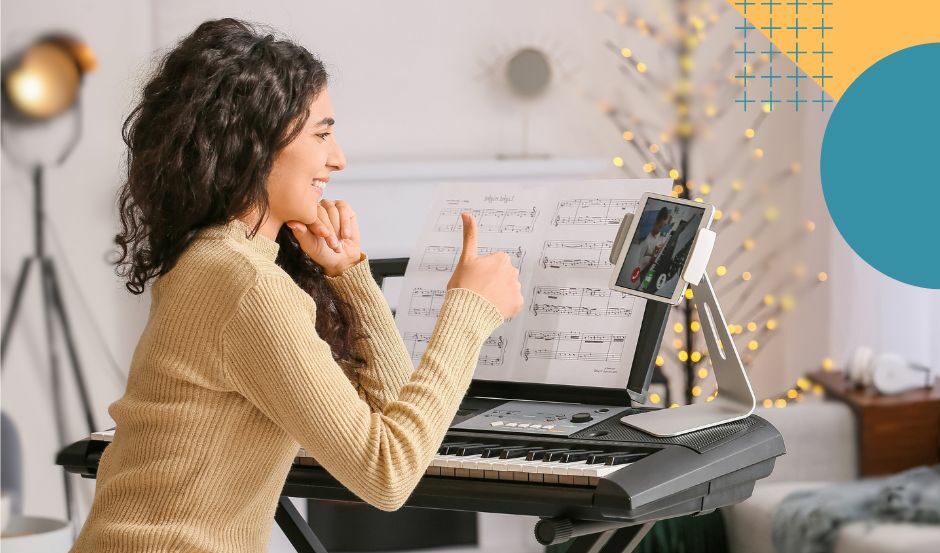The Top 5 Benefits of Online Piano Lessons for Homeschool Families
A guide and benefits to help you add piano to your homeschool routine

Rose Park
updated 9/13/25 • 4 min read
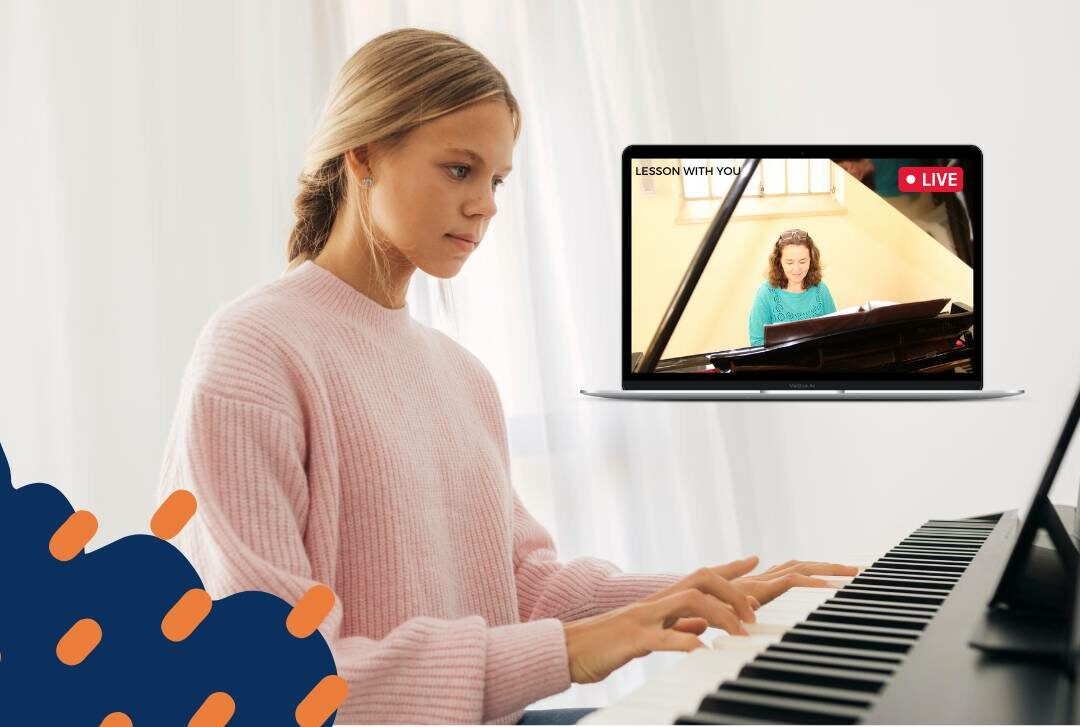
Homeschooling families are always looking for activities that build both academics and creativity — and piano lessons do exactly that. Piano is one of the most versatile instruments for kids, helping them build focus, coordination, and confidence.
So why choose online piano lessons for homeschoolers instead of in-person lessons or self-study?
Here’s why piano is the perfect instrument for homeschoolers and how online lessons can make learning even more enjoyable.
Why Piano Is the Ideal Instrument for Homeschool
1. Piano Improves Concentration and Focus
2. Builds motor skills and coordination

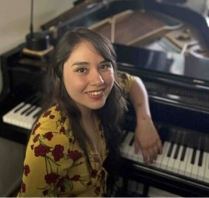
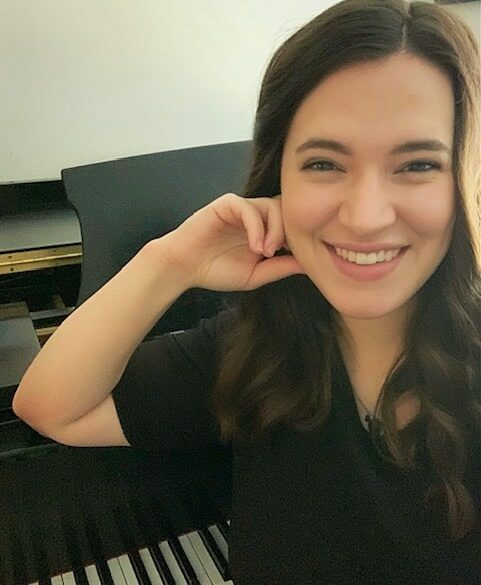

Try a Free 30 Minute Lesson with Piano Specialists
60+
Instructors
50,000+
Lessons taught
4.9/5 ⭐⭐⭐⭐⭐
Average lesson rating
3. Encourages creativity and expression
4. Strengthens memory and learning abilities
Memorizing music and understanding theory keeps students’ memory sharp. With consistent practice, homeschoolers develop techniques that also support academics, such as remembering math formulas or learning vocabulary in a new language. Piano lessons make this mental exercise both enjoyable and effective.
5. Develop problem-solving skills
When your child works through tricky music pieces, they’re building much more than piano skills. They’re also developing critical thinking and problem solving abilities that carry into homeschool and everyday life. By slowing down hard sections, breaking them into smaller parts, and trying different finger placements, they learn to approach challenges creatively and patiently. This kind of practice also builds determination, showing them that real progress comes from steady effort.
What Makes Live Online Piano Lessons Perfect for Homeschool
Flexible scheduling and location
Customized piano curriculum
Unlike pre-recorded videos or apps which offer a fixed structure, live online lessons connect your child with professional instructors in real time. This means your child gets customized feedback, tailored lessons, and encouragement right when they need it.
Whether your child is a beginner or more advanced, online teachers can adjust their approach to match their age, musical interests, and goals. And with the convenience of learning from home, you save time on commuting while still giving your child a high-quality music education.
Cheaper lesson costs
Online piano lessons with live teachers are a budget-friendly option for homeschool families compared to in-person lessons. Based on our recent piano lessons cost guide, the average cost for online piano lessons in the USA is $40 per half hour lesson, whereas in-person lessons charge $50 for a half hour lesson on average.
If you’re interested in finding quality piano lessons with expert piano teachers at $35 per half hour, visit Lesson With You and get a free trial today.
Live private instruction
Online piano lessons offer a wider range of highly skilled piano instructors who may not be available locally or may have limited schedules. These days, there’s little need to worry about teacher quality between in-person and online lessons because now even the very best piano teachers offer lessons online.
This give your child more opportunities to experience diverse music genres, styles and piano techniques taught by professionals all around the world.

Explore LWY music lessons
Piano Lessons | Singing Lessons | Guitar Lessons | Cello Lessons | Drum Lessons | Violin Lessons | Viola Lessons | Flute Lessons | Clarinet Lessons | Saxophone Lessons | Acoustic Guitar Lessons | Bass Guitar Lessons | Electric Guitar Lessons | Trumpet Lessons | Trombone Lessons | Oboe Lessons | Ukulele Lessons
How to Add Piano Lessons to Your Homeschooling Schedule
1. Find a professional piano instructor
Adding piano lessons to your homeschool routine can be a wonderful way to enhance your child’s education. As mentioned above, online piano lessons are especially effective because they provide one-on-one attention from teachers.
Begin by browsing online teaching platforms to find potential piano instructors, preferably with a Bachelor’s degree in piano. After trying out a trial lesson, prioritize weekly lessons for steady progress. Infrequent lessons, like bi-weekly or monthly, can lead to slower improvement due to extended breaks.
Tip: Watch any performance recordings listed on a potential teacher’s profile or on YouTube. A teacher with a music education degree focusing on piano is fine, but it’s better in the long run to stick with an instructor who has a degree specifically in piano performance.
2. Track practice and assignments
Tracking your child’s assignments and practice doesn’t have to feel overwhelming. While there’s no need for you to be present during every lesson unless the teacher prefers it, having a notebook on hand for your child to write down assignments and practice goals is a great start. You can check in occasionally and talk to the teacher about how your child is progressing.
Consistency is key when it comes to learning piano. A good rule of thumb is 15 to 20 minutes of focused practice every day or at least four times a week. This helps reinforce skills learned in lessons and builds confidence over time.
Of course, it’s normal for kids to feel unmotivated at times. Try to encourage practice in a way that feels rewarding, not stressful. If you’re unsure whether they’re practicing effectively, their teacher can suggest tips and guidance.
3. Go beyond the lessons
Piano lessons are just the beginning of your child’s musical journey. Encourage them to explore music that excites them, whether it’s a favorite composer or a fun piece they’ve discovered. For example, if they’re curious about Beethoven, they can listen to Moonlight Sonata or Symphony No. 5 and learn a bit about his life.
Websites like Classic FM or educational YouTube channels can also make this exploration fun, adding a deeper connection to their piano lessons.
What’s the Best Age to Start Homeschool Piano Lessons?
The best age for children to start piano lessons is usually between 7 and 9 years old. But it really depends on how ready your child feels and how interested they are in learning the piano.
What’s important is that your child should be able to communicate with the piano teacher, focus on the materials for at least half an hour, and practice consistently throughout the week. This also means a child should be able to read at a somewhat basic level to understand musical theory written in the method book.
At Lesson With You, we recommend children start piano lessons around age 7. Learn more in What’s the Best Age to Learn Piano?
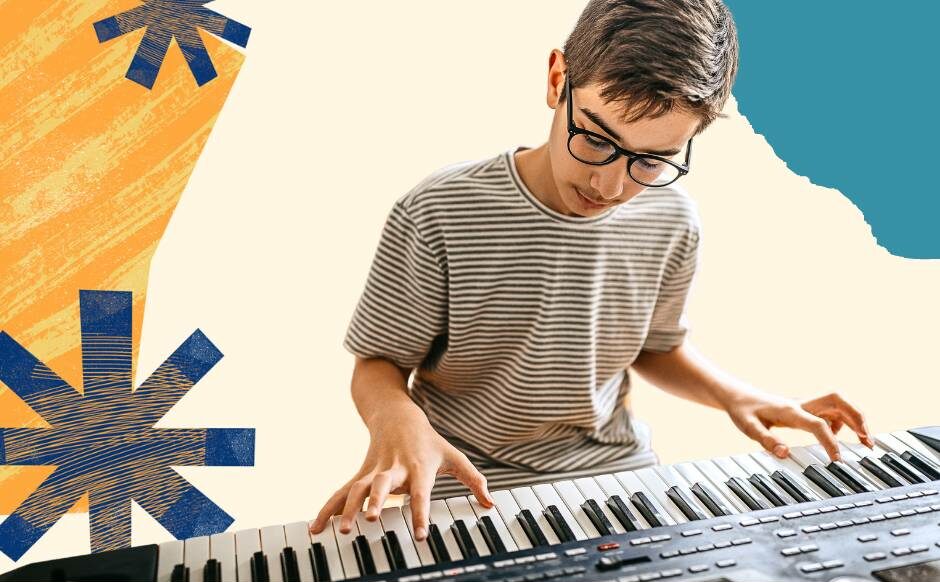
How Often Should My Homeschooled Child Practice Piano?
We generally recommend children between the ages of 7 and 9 to practice piano at least three times a week for about 15 minutes per session. For those aged 10 to 13, aim for three practice sessions a week, each lasting around 20 minutes on average. For students older than 13, try to practice three times a week, with session durations ranging from 20 to 30 minutes each (frequency may vary).
It’s okay if your child misses one or two practice sessions a week sometimes; what’s more important is that they enjoy learning to play the piano and use their practice time efficiently. Additionally, try to avoid long breaks between lessons, such as during a month-long summer vacation. Students can forget many things, including fingerings and techniques, within just a few weeks without lessons and practice.
How Much Does It Cost to Begin Piano Lessons?
As a homeschooling parent, understanding the cost of piano lessons is important when planning your child’s music education. Piano lessons typically range from $40 to $90 per hour, depending on factors like the teacher’s qualifications, location, and whether lessons are in-person or online.
On average, you can expect to pay around $80 for a one-hour private lesson in the US. If you’re looking for live online lessons through platforms like Zoom or GoogleMeet, rates typically range from $20 to $40 for a half-hour session.
For local private lessons, a half-hour lesson typically costs between $35 and $50, while in-person group lessons can be more affordable, starting at $25 for a half-hour.
Looking for Affordable, Quality Online Lessons?
Lesson With You offers 1 on 1 live online piano lessons with vetted, expert piano instructors. Learn comfortably from home without traveling or hosting a teacher, which saves time and makes scheduling easier for homeschool families.
The first trial lesson is FREE! No contracts ever.
Piano Guides for All Levels
Interested in a certain style?
Musical Theatre Singing Lessons | Classical singing Lessons | Rock singing Lessons | Country singing Lessons | Pop Singing Lessons
Classical Guitar Lessons | Acoustic Guitar Lessons | Jazz Guitar Lessons | Rock Guitar Lessons | Electric Guitar Lessons | R&B Guitar Lessons

Rose Park
Rose Park is a graduate of the Jacobs School of Music at Indiana University where she studied Piano Performance and Arts Administration, receiving both Bachelor's and Master's degrees before co-founding Lesson With You. As a pianist, Rose was a prizewinner in many international piano competitions and performed at various summer programs and festivals across the United States, Italy, and Japan.

